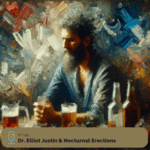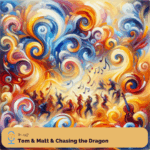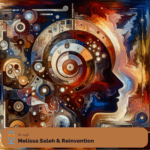
Dr. Elliot Justin & Nocturnal Erections
Takeaways
- Elliot moved to Bozeman in 2005 and has seen cultural changes.
- He believes living in a smaller town allows for a balance of being known and unknown.
- Elliot’s medical journey began with a unique experience related to his health habits.
- He emphasizes the importance of nocturnal erections as indicators of health.
- Elliot’s research focuses on neuromodulation and its effects on sexual function.
- He has documented over 85,000 erections in his research.
- The concept of fading erections is a common issue among aging men.
- Elliot discusses the role of technology in monitoring sexual health.
- Safety concerns around erection rings are primarily about user behavior.
- Innovative devices are being developed to enhance sexual health and function. Erectile dysfunction is often a misunderstood issue that requires open discussion.
- Pornography can create unrealistic expectations for sexual performance.
- Communication is key in addressing sexual health issues within relationships.
- Testosterone therapy should be a standard part of men’s health check-ups after a certain age.
- Data collection can help men understand their sexual health better.
- Sexual health technology is evolving to provide better insights and solutions.
- Cultural stigma prevents open conversations about male sexual health.
- Regular sexual activity is linked to better overall health and lower divorce rates.
- Men and women both consume pornography, but the conversation often focuses only on men.
- Innovative devices can help monitor and improve sexual health.
Summary
In this engaging conversation, Elliot Justin shares his journey from California to Bozeman, discussing the cultural shifts he has witnessed. He delves into his medical career, focusing on sexual health and the importance of nocturnal erections as indicators of overall health. Elliot explores the innovative use of technology in monitoring sexual function and the implications of aging on erectile health. He emphasizes the significance of data collection in understanding men’s health and the evolving landscape of sexual wellness devices, including erection rings. The discussion highlights the intersection of medicine, technology, and personal experiences in the realm of sexual health. In this conversation, the speakers delve into the complexities of male sexual health, addressing topics such as erectile dysfunction, the impact of pornography, communication issues in relationships, and the importance of testosterone therapy. They emphasize the need for data in understanding sexual health and explore innovative technologies designed to enhance sexual wellness. The discussion also highlights the cultural stigma surrounding these topics and the necessity for open communication between partners.
Chapters
00:00 Introduction and Background of Dr. Elliot Justin
02:45 Transition to Medical Career and Unique Experiences
05:41 Exploring Sexual Health and Neuromodulation
08:26 The Importance of Nocturnal Erections
11:22 Understanding Erectile Health and Aging
14:12 Data Collection and Insights on Erections
17:03 Fading Erections and Vascular Health
19:50 Practical Advice for Sexual Health
20:48 Exploring Male Sexual Health and Enhancement
23:35 Safety and Efficacy of Sexual Devices
28:13 The Intersection of Sexual Health and Cardiovascular Fitness
31:56 Understanding Porn Addiction and Male Sexuality
37:46 Testosterone Therapy: Myths and Realities
46:28 Debunking Testosterone Myths
48:53 Understanding Sexual Health and Aging
50:50 The Role of Technology in Sexual Health
56:50 Exploring Sexual Devices and Their Benefits
59:30 Future Innovations in Sexual Health Technology
01:03:45 The Importance of Open Conversations About Sexual Health
Sponsor Spotlight
Curious about the tech transforming men’s sexual health? Check out FirmTech—a leader in smart sexual health devices. Their wearable tech is changing the way we understand performance, health, and longevity in the bedroom.
Use code IrreverentHealth at checkout to support the show, get 15% off any FirmTech orders, and get started with tools built for real, measurable results.
Podcast: Play in new window | Download








